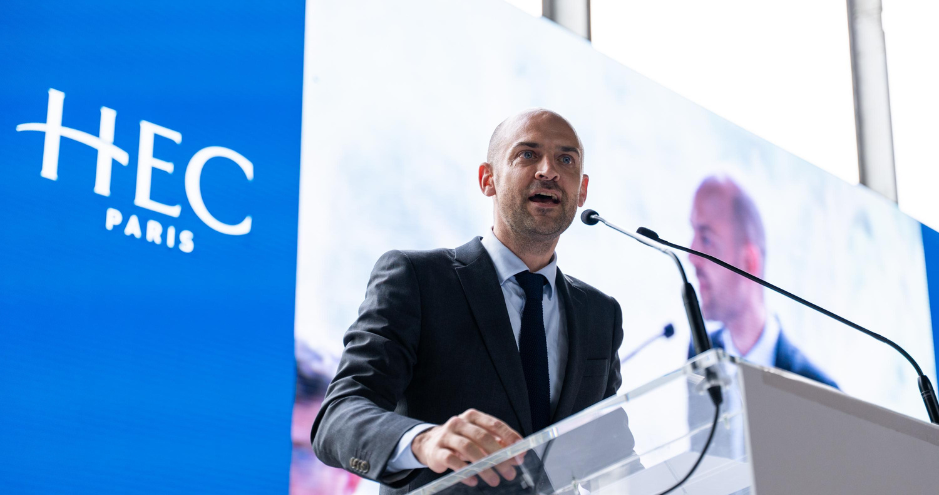Jean-Noël Barrot at HEC Paris Graduation: “We Stand for Free Science and Academic Freedom”
On June 14, 2025, HEC Paris welcomed back one of its most distinguished alumni and professor of finance, Jean-Noël Barrot, to deliver the commencement address – a resounding call to resistance.

Currently France’s Minister for Foreign Affairs, Barrot captivated the Class of 2025 with courageous statements following Trump’s attacks on Universities. Speaking not just as a policymaker but also as a professor and proud HEC graduate, Barrot delivered a passionate plea for academic freedom, scientific integrity, and civic engagement - and a call to graduates to resist and take action in a world where our fundamental values are under threat.
When the certainty of peace, prosperity, and democracy starts to crumble, it’s time to think.
Jean-Noël Barrot opened his address with humor and nostalgia, recalling his student days on the HEC campus during the early 2000s. He painted a vivid picture of a hopeful youth, shaped by pop culture and the promise of prosperity. He spoke of unforgettable memories, the friendships and lasting bonds forged on campus - experiences that shaped both his personal and professional journey.
“Like all of you, I’m forever grateful to this school. I received so much from those three years on campus. I stepped into a community to which I belong forever.”
But his tone quickly turned to urgency as he chronicled how the world’s certainties — peace, prosperity, and democracy — have steadily unraveled over the past two decades.
Barrot, who holds a Master in Management – Grande École degree, enrolled for five additional years to start a PhD to “turn into academic research,” (...) curious to understand what was at stake and how this emerging world would really work.
He described his PhD at HEC as “a life-changing experience. I basically learned to look at the world with open eyes and an unbiased mind.”
“Professors are an elite — the special forces of science.”
He paid tribute to his HEC faculty colleagues — the professors who shaped his thinking — including David Thesmar, the late Denis Gromb, and Antoinette Schoar at MIT:
“I stood on the shoulders of giants (…) extraordinary minds who dedicate their lives to advancing the knowledge frontier. (…) They have made me a better researcher and a better person.”
Looking beyond individuals, he wished to recognize the profession as a whole and its role in society, and invited graduates to stand up — and especially to pay tribute to HEC's professors: “Professors are an elite — the special forces of science. Fighters of a cause that is today under attack. Science is questioned. Science is mistrusted. Science is politicized. Yet the truth is this: we need more research. More academic freedom. More science, not less. Free and open science.”
“We stand with Harvard faculty. With Harvard students.”
Science mistrust has grown over recent years due to a complex interplay of political polarization, misinformation, populism, and recent decisions leading to sweeping cancellations and funding cuts across numerous major scientific programs, with particularly severe impacts on climate research, biomedical science, STEM education, and international collaborations.
Against this backdrop, Barrot declared: “Yet the truth is this: we need more research. More academic freedom. More science, not less. Free and open science. Science is key for knowledge. (…) Science is key for democracy. (…) Science is key for prosperity.”
He called upon the Class of 202, and beyond to take responsibility:
“So, friends. We have been trained in one of the most prestigious schools in the world. We are grateful for it. And we stand for free and open science. We stand for academic freedom.”
In a forceful defense of universities as bastions of liberty and democracy, Barrot warned against growing political pressures on academic institutions across the world: “For there are places where university is no longer a sanctuary, but an area of political control.”
He decried the repression of intellectual freedom - from surveillance in classrooms to book bans and restrictions on research funding - declaring:
“We reject the fog of obscurantism.
We reject political and religious restrictions to research.
We reject attempts to intimidate researchers and redirect their work.
And yes, we stand with free spirits who dream beyond limits.
We stand with universities facing the threat of government control, restrictions to their funding, constraints on their curricula or research projects.”
Barrot extended a strong message of solidarity to faculty and students at Harvard. Echoing President Macron’s recent speech at the Sorbonne, he reaffirmed France and Europe’s commitment to remain havens for unfettered research and intellectual pursuit. “To faculty and students around the world, I say: our arms are wide open, join us now!”
From Students to Citizens: “Seize the weapons of the spirit”
Closing his address, Barrot invited graduates to see their roles not only as future leaders in business, but as citizens of a world in need of rebuilding. In a global context marked by war, climate change, and democratic backsliding, he emphasized that leadership must be rooted in values and civic responsibility: “There is one single office more valuable than any other — the office of citizen.”
He reminded them that being trained in strategy, management, or economics is not an end in itself — it is a toolkit for service, for action, and for shaping a more just and sustainable world.
“Let’s stand up. Let’s get ready to lead, to serve and to shape the future. Because the future is ours.
We need you. Your talent, your energy, your drive. We need citizens, to seize the weapons of the spirit — the weapons of knowledge — to resist.
Resist violence and brute force.
Resist resentment and revenge.
Resist indifference and resignation.
Rather than being spectators of the crumbling of the old world, you now have the power to be the actors of a new one.
You have the power to say “no.” Use it!"